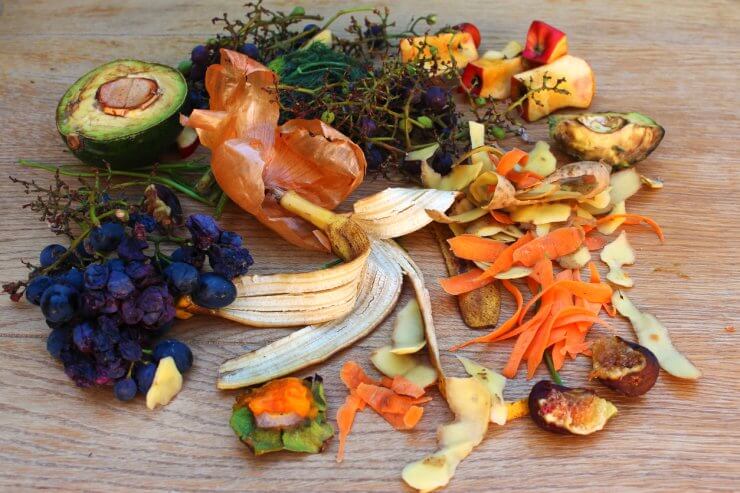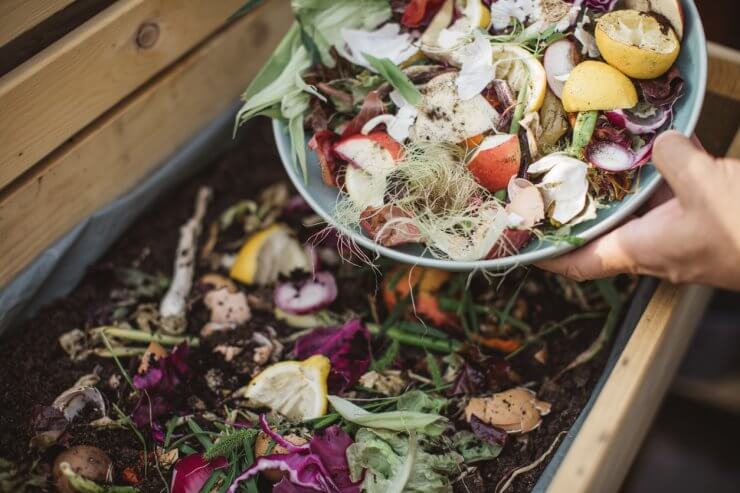
Compost ingredients
If there is a magic formula to a bountiful vegetable garden, compost has an honored place in the mix. Good compost is rich in the nutrients your plants need to grow. In addition, compost can double as mulch, it’s environmentally friendly, and the process of composting is pretty darn easy. That said, some compost ingredients are vital for the best compost possible.
If the idea of following strict guidelines, weighing your ingredients, and carefully following a compost recipe stresses you out, relax. Compost is magic, but there’s no sleight of hand or complicated illusions here. Your compost won’t fail because you throw a few too many eggshells in there, or you forget to stir it one week.
Composting is about as easy as it gets, and the payoff is enormous.
Discover 7 top tips for growing, harvesting, and enjoying tomatoes from your home garden—when you access the FREE guide The Best Way to Grow Tomatoes, right now!

A quick review of composting basics
Alright, in case you’re new to composting, or you need a refresher, here’s how this works. Composting is the action (or verb for us grammar nerds). It’s simply the act of decomposition, the result of which is compost (noun). I like the definition offered by the Natural Resources Defense Council:
“Composting is the natural process of recycling organic matter, such as leaves and food scraps, into a valuable fertilizer that can enrich soil and plants. Anything that grows decomposes eventually; composting simply speeds up the process by providing an ideal environment for bacteria, fungi, and other decomposing organisms(such as worms, sowbugs, and nematodes) to do their work. The resulting decomposed matter, which often ends up looking like fertile garden soil, is called compost.”
That “ideal environment” includes a mix of air, water, carbon, and nitrogen. The carbon and nitrogen come from what’s commonly referred to as the brown and green ingredients. Mixed properly, these four compost ingredients create an atmosphere where microorganisms can thrive and break down the materials into nutrient-rich compost.
Air provides oxygen for microorganisms. Ensuring a supply of oxygen is why you occasionally stir or tumble your compost pile. The microorganisms also need moisture. You don’t want so much water that your compost is soaked, but you need enough to keep things moving.
Incidentally, green ingredients (which we’ll get to more in a moment) often have enough built-in moisture that you don’t need to add water.
This may sound complicated, but it’s not. Nature does most of the work for you. You come in mainly by providing the mixture of brown and green compost ingredients. We’re looking for a roughly 50/50 mix of the two. But what are those ingredients?
Brown and green: Your guide to the compost ingredients for a perfect pile
Okay, now we can get into the brown and green compost ingredients that will turn your pile of yard waste and food scraps into a pot of black gold. But first, a disclaimer.
There are entire books and websites dedicated strictly to composting. You can get super scientific with the process, looking at how much carbon or nitrogen any particular ingredient has or the internal temperature and moisture content of your compost pile. I don’t want to disparage them in any way. That information can be helpful when you need to troubleshoot or if you want a detailed look at the process.
However, it’s also easy to get overwhelmed with that much information. I’m hoping to keep things relatively simple here. We have some other articles on composting if you want to explore the topic further.
- How to Make Natural Compost from Everyday Food Waste
- How to Avoid Salmonella in Compost
- Easy Composting at Home: 5 Ways to Compost from Hardest to Easiest,
That said, here’s a general breakdown of the brown and green ingredients.
Brown compost ingredients provide carbon, which provides energy to the composting microbes. Green materials provide nitrogen, which provides the proteins and materials needed for microbe growth.
Incidentally, this isn’t about the actual color of materials. For the most part, brown ingredients are dry or hard. Items like shredded newspaper, dead leaves, or paper egg cartons fall into the brown category. The more you chop, shred, or tear these ingredients before adding them to your compost, the more quickly they will decompose.
Green items tend to be softer or “wet.” These include most kitchen scraps, like corn cobs and eggshells, as well as fresh grass clippings or some manure. (I should point out that only certain kinds of manure are suitable for composting, and even then, they need plenty of time to decompose. Chicken and rabbit droppings are great, as is cow manure, but stay away from dog or cat waste.)
Now then, I think we’re finally at the point of listing the best compost ingredients! In no particular order, here are some of the items that will give you super duper compost.
- Eggshells
- Shredded cardboard
- Shredded newspaper
- Dead leaves
- Sawdust
- Straw
- Nutshells (Except black walnut shells; they contain a toxin that kills other vegetation.)
- Chicken manure
- Coffee grounds
- Fruit pits and peels
One last ingredient that I find helpful is patience. Composting isn’t a quick project. It is, however, full of rewards.
What would you recommend adding to the compost pile? I’d love to get your thoughts in the comments.
Discover 7 top tips for growing, harvesting, and enjoying tomatoes from your home garden—when you access the FREE guide The Best Way to Grow Tomatoes, right now!





I have a jar of kalamata olives that went bad in the fridge, do you think I could add that to my compost?
Can I add onion to the copost?
Yes, I do. I think the skins might fall into the “brown” category.